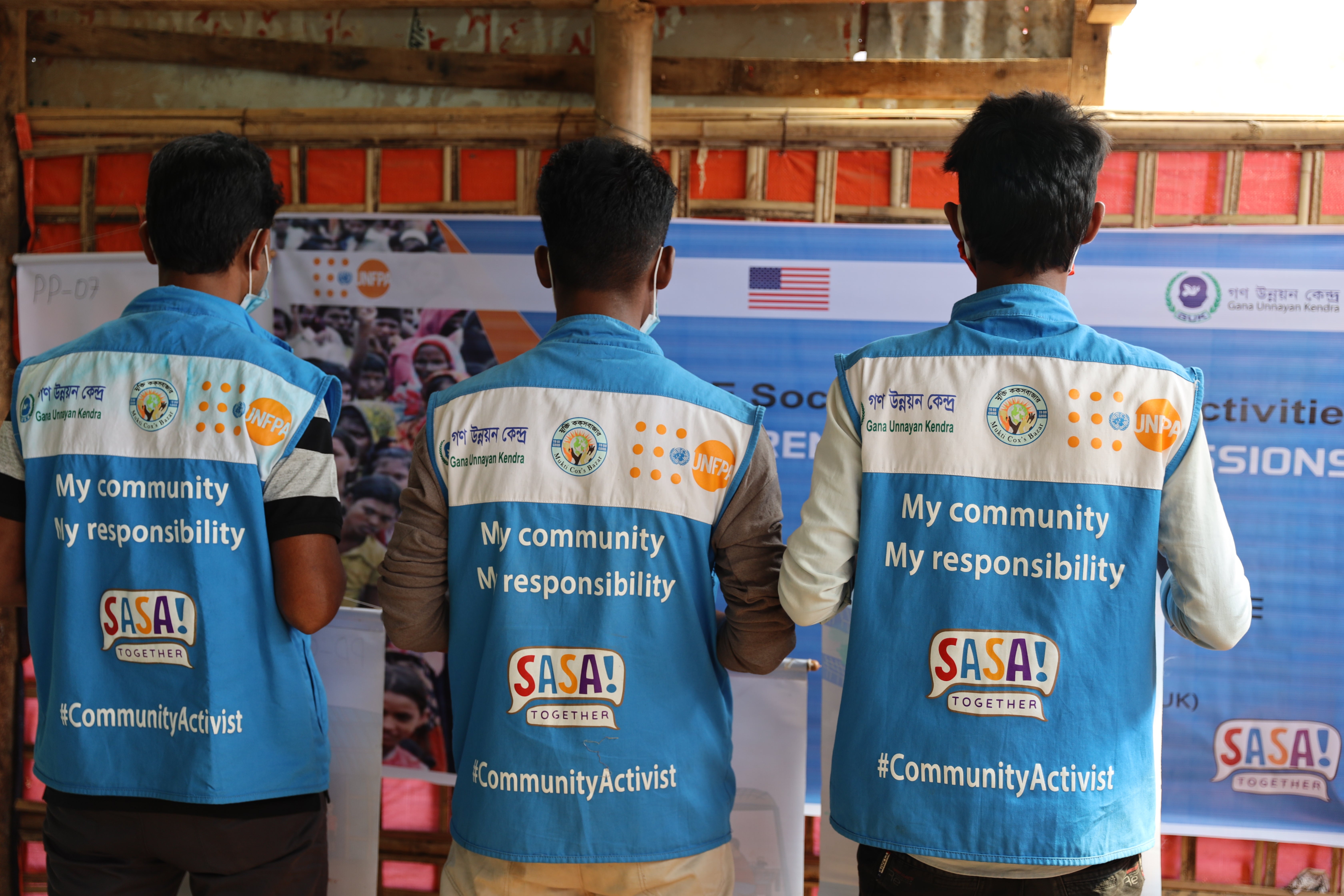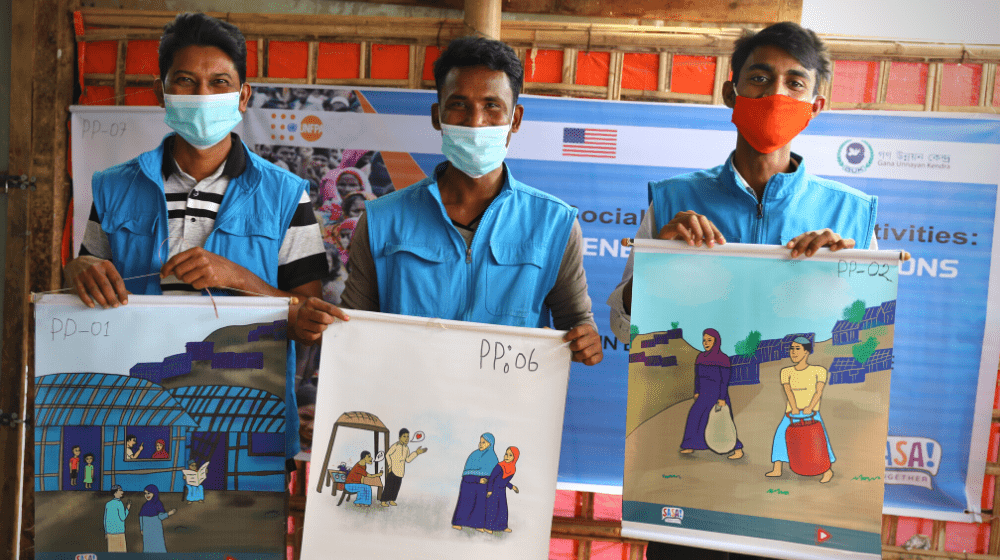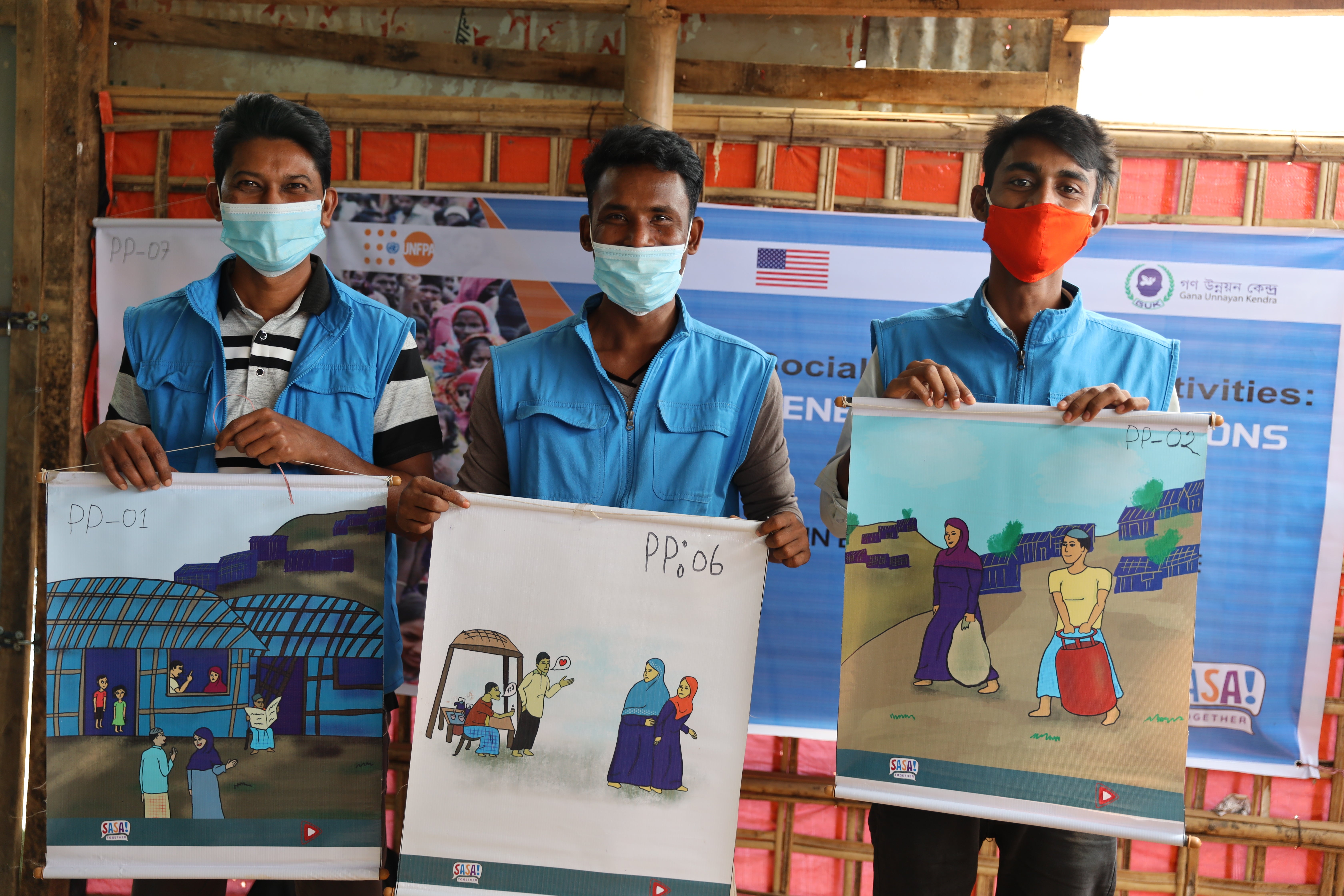
From left: Nour Mohammed, Mohammed Zubair and Nourul Amin, SASA! Together with community activists in the Rohingya refugee camps UNFPA Bangladesh/Fahima Tajrin
“Being a community Activist means being the Change agent that we wish to see in our community and in the world” Nourul Amin, 19 years old, a Rohingya adolescent boy who fled from Myanmar in 2017 to find shelter and refugee in Cox’s Bazar, shares during a SASA! Together GBV innovative social mobilization approach developed by Raising Voices, tapping into the inner power of each individual to stimulate a behavioural change attitude towards addressing and preventing violence against women and girls.
SASA! Together is a step-by-step social mobilization approach, used in both Rohingya and host communities, to prevent gender-based violence and end all forms of violence against women and girls. The methodology, whose acronym stands for Start, Awareness, Support, Action has been operational in Bangladesh since December 2020, reaching a total of 96,293 (58,819 Female, 36, 474 Male) men and boys in community activism campaigns, trainings, brainstorming and knowledge-sharing sessions, group works and discussions to inform, share and increase awareness on the different forms of GBV and the safety of women and girls, which translates into positive relationships nurtured by Hope, Positivity, Communication, Respect and Equity.
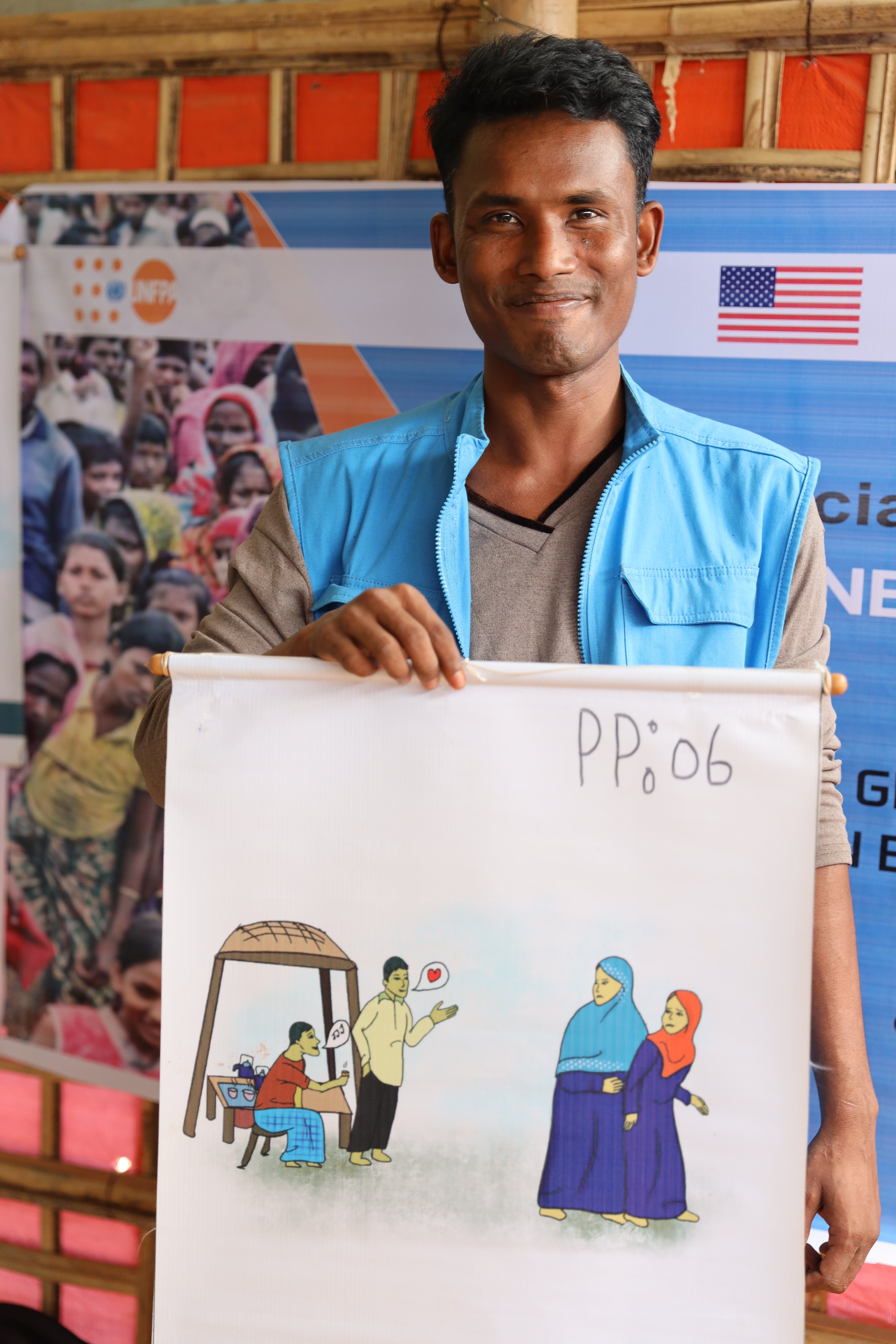
In the photo: Mohammed Zubair, a community activist in Cox’s Bazar UNFPA Bangladesh/Fahima Tajrin
“I voluntarily signed up to become a community activist because I understood that I misbehaved towards my wife, my children and my in-laws” Mohammed Zubair, 30 years old, starts “during one of the SASA! Together sessions, I realized that my acts and words were GBV, I could start again and I could be the change agent that I would like to see among my neighbours and my community when it comes to preventing gender-based violence”.
By using a wide array of tools to reflect and to act towards the creation of a fairer and more gender-equal society, both Rohingya and the Bangladeshi host communities use power posters, drama sketches and fruitful discussions to be that Change, becoming the role models and exemplary for the whole community.
“The aim of the SASA! The methodology is to use the collective power and sustain change that prevents gender-based violence in general” states Mr Tesfaye Barge, Gender-Based Violence (GBV) Social Mobilization Specialist at UNFPA Bangladesh, based in Cox’s Bazar “To reach our aim, we focus on knowledge-sharing and on strengthening access to information regarding the basics of power-gender analysis. We then tap into the feeling that we can all do something (and we have the power) within ourselves to prevent GBV; we reflect on power in our own lives, in our communities and, to finally enhance the operational culture of institutions (values, employee morale and power dynamics) to prevent GBV”.
At present, UNFPA has trained 2,350 (950 Male and 1,400 Female) Community activists conducting formal and informal GBV sessions in their community, 1,840 (630 male, 1,210 Female) Community and religious leaders, and 74 (54 Female, 20 Male) Institutional allies in camps and adjacent host communities. Moreover, there are 133 (86 Female, 47 Male) Trained GBV social mobilization experts working with UNFPA partners (GUK and MUKTI Cox’s Bazar).
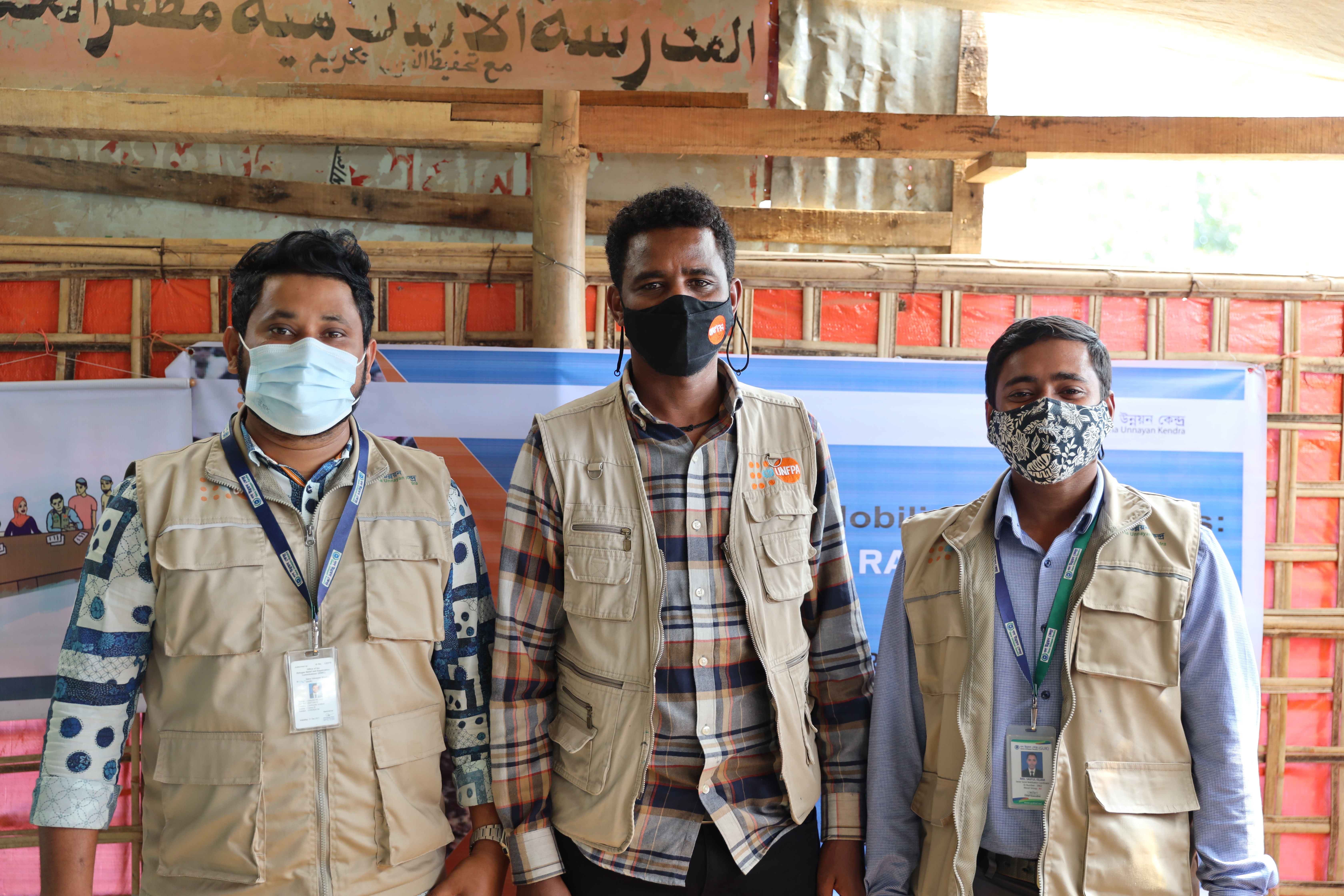
From left: UNFPA social mobilizers and Mr. Tesfaye Barge, GBV Social Mobilization Specialist in Cox’s Bazar (centre) UNFPA Bangladesh/Fahima Tajrin
The topics of discussions during these sessions are GBV Power Posters, Community Conversations, Deeper Discussions among partners, Cultural Games promoting GBV, Community Posters, Drama, Key GBV information dissemination, Social network/group cultural activities, and community-wide events/Campaign. These multiple ranges of activities helped impartial access to GBV information, services and knowledge sharing among diversified groups at different levels.
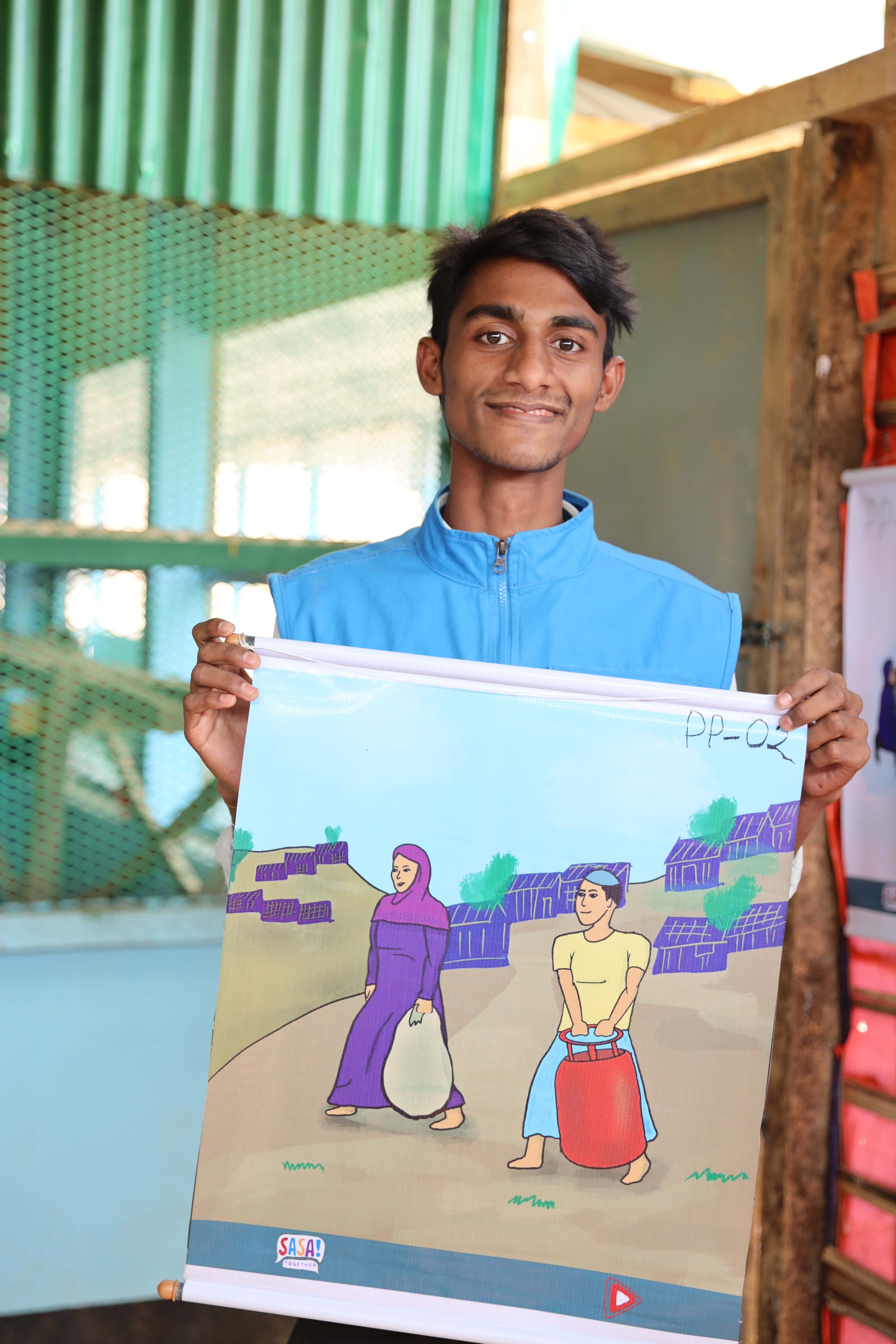
In the photo: Nourul Amin, a community activist in the refugee camps, holding a power poster on sharing responsibilities and gender–equity UNFPA Bangladesh/Fahima Tajrin
“We are learning about the qualities of positive relationships, that englobe respecting, valuing and caring among men and women. Being able to treat others as I would like to be treated, appreciating my partner for who she is and consistently showing her kindness and compassion are some of the teachings that we are working as part of the sessions” Mohammed Zubair continues.
“Through the sessions, I recognized that I was misusing my power towards my wife. I used to get aggressive at her because she would always take so much time fetching water and coming back home. Thanks to SASA! Together with learning sessions, I decided to accompany her in the chore, and I suddenly discovered that she was actually really fast, avoiding crowds and queues. I am grateful because I changed my attitude towards her, and now we are peaceful at home and within the family” Nour Mohammed, 35 years old, comments on the lessons learnt from SASA!
“The work of activists includes fostering activism among others – creating communities of support among us, as well as critical mass needed for social change towards Violence against women. Activists engage others in learning and talking about GBV, its root causes and consequences. They help people to creatively channel their outrage at injustice into strategies for leading positive change” GBV Social Mobilization Specialist Tesfaye highlights.
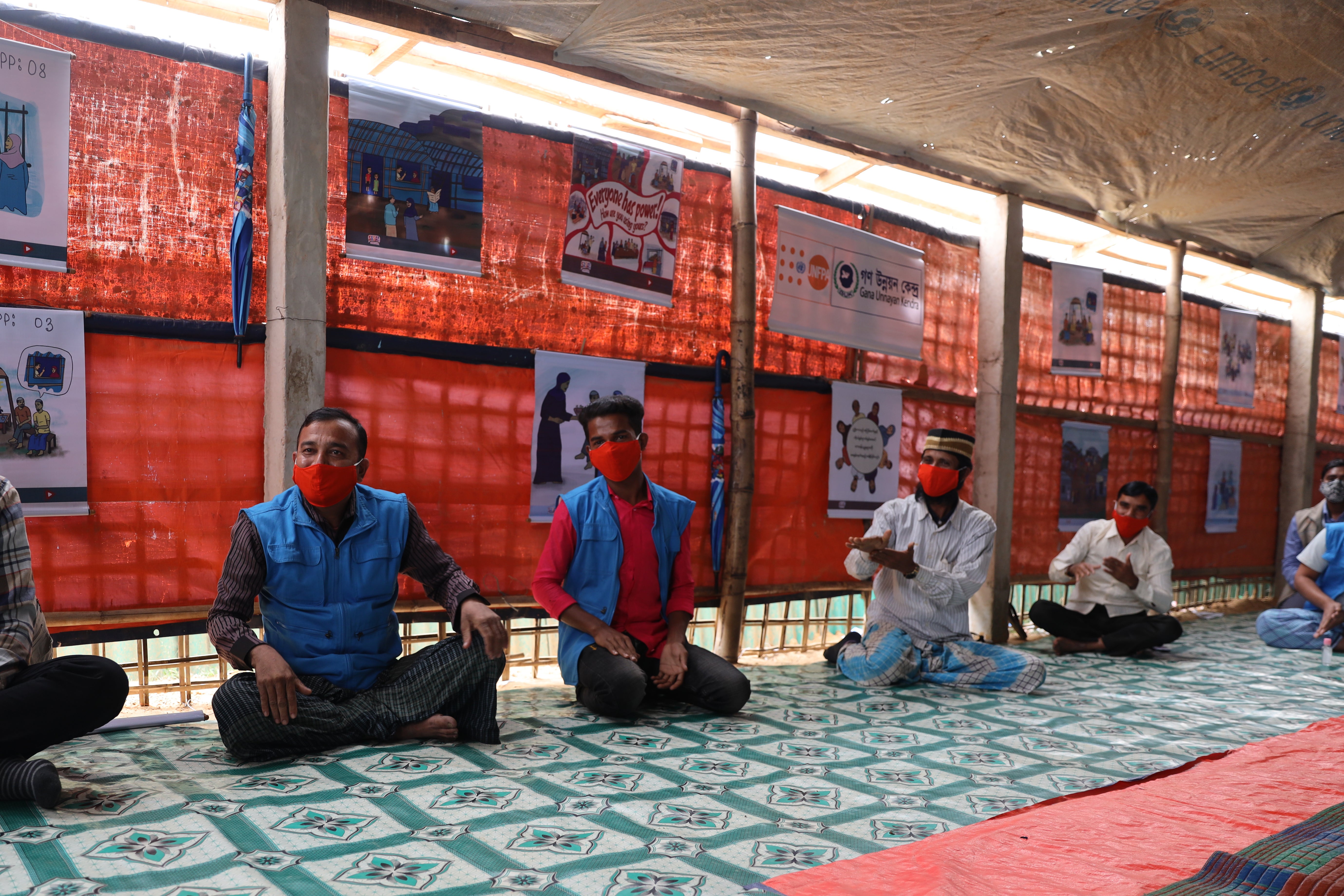
In the photo: a SASA! Together with training to prevent gender-based violence, using fruitful discussions and power posters UNFPA Bangladesh/Fahima Tajrin
The so-called “Circle of Influence” (oneself, family, friends, neighbours, community) instils in community activists the willingness to share their experiences and motivate other men and boys in ending all forms of violence against girls and women.
“My dream is that all men and boys in the community respect women and girls, and that they work on themselves to improve their behaviors. If we want to change the community, we need to start from us and our families. I believe that with SASA!Together Approach, everyone works together to end gender-based violence and changes their mindsets” Nour Mohammed said.
This approach can be summed up in its Benefits-based activism; focusing on a gender-power analysis; across Four phases of change (START, AWARENESS, SUPPORT and ACTION) through ensuring Holistic community engagement. Community activists are the owners and leaders of the approach, and mould it, based on the context in which they are living, to provide their own solutions for creating GBV free community ” Mr. Kajol, UNFPA Community Social Mobilizer points out “It is a continuous process of change, where people trust people and, together, they protect, empower and improve the community, as a holistic exercise.
“If we use our power positively, we can all be the change makers for a world free of gender-based violence!” conclude Nourul Amin, Mohammed Zubair and Nour Mohammed in unison.
